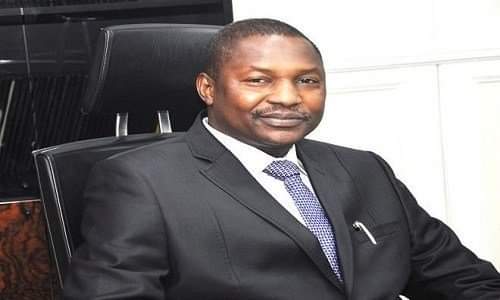
The Minister of Justice and Attorney General of the Federation, Abubakar Malami
The Presidency says there is no going back on its decision to implement the newly signed Executive Order 10 which grants financial autonomy to state legislature and judiciary.
The Secretary of the Presidential Committee on Implementation of the Executive Order 10, Senator Ita Enang, reiterated this position at a press conference in Abuja on Sunday.
Last Wednesday, the Nigeria Governors Forum resolved to engage the Attorney-General of the Federation and Minister of Justice, Abubakar Malami, in order to reflect on the implications of the Executive Order 10 on governance at the sub-national level.
The forum asked its Legal Committee, comprising Governors Aminu Tambuwal, Sokoto; Simon Lalong, Plateau; and Rotimi Akeredolu, Ondo to meet with the minister on the matter.
Addressing newsmen on Sunday, Enang, who is also the Senior Special Assistant to the President on Niger-Delta Affairs, noted that the Order was passed by the 8th Assembly and could not be halted.
He said the chairman of the implementation committee, Abubakar Malami, and other members were working round the clock to ensure its implementation.
“Since that law was not implemented, I mean that amendment from 2017, 2018, and in 2019, the president considered, as the head of the Federal Government of the Federal Republic of Nigeria, to which every member, of who has a duty to protect every Nigerian and each arm of government at the state and the federal levels, that it was necessary to set up an implementation committee to cause implementation.
“The Act was passed in 2017, amending Section 121(3) of the Constitution, allowing for monies to go directly to the legislature of the state level and judiciary at the state level.
“Since it was not implemented, Mr. President allowed 2017, 2018 since there were so many complaints.
“And part of the complaints of the governors and part of the complaints of implementation was that there were no modalities for implementation.
“Since the constitution when passed is not self-executing, then Mr. President has to set out the procedures for implementation.
“In efforts to set out the permit procedure for implementation, Mr President considered it appropriate to set up a Presidential Implementation Committee on the autonomy of state judiciary and state legislature,” the top presidential aide stressed.
‘Nothing to fear’
Enang said the governors had nothing to fear about any provision in the law and the Executive Order, explaining that Buhari only took a step to implement the law.
He said: “What a lot of people have had reservations or have been afraid of, is the provision which says that where the state fails to remit the money due to any arm of government in the consolidated revenue fund of the state, upon receipt of money from the Federation Account, and also money from Internally-Generated Revenue, the Accountant-General of the Federation will now deduct that amount standing to the credit of that state in the Federation Account and remit directly to either the house of assembly of that state or the judiciary of that state.
“It is important to emphasize that this deduction is not a fast line action.
“It is if the State Government, the state executive or the Accountant-General of the state fails to remit the money of that arm of government to another arm of government.
“So, they are free to operate, but when one arm is oppressing the order and fails to remit the money due to that arm of government, then that will be reported to the Accountant-General of the Federation and the provision for direct deduction will be activated.”
Members of implementation committee
The implementation committee has the two Chief Judges representing the bodies of Chief Judges of State Judiciary; the Grand Kadi of the Federal Capital Territory and the Grand Kadi of Gombe State representing Grand Kadies; the Customary Court of Appeal President representing Customary Courts of Appeal; the President of Nigerian Bar Association; the President of the Judiciary Staff Union of Nigeria; the chairman of the Conference of Speakers, who is the Speaker of Lagos State House of Assembly, Olatunji Obasa and Abel of Taraba State House of Assembly on behalf of 36 Houses of Assembly.
Others are; the President of the Parliamentary Staff Association of Nigeria; a representative of the Houses of Assembly Service Commission and the Clerk of the House of Assembly of Nasarawa State representing Houses of Assembly Clerks.
When contacted, the Head of Media and Public Affairs of the Nigeria Governors’ Forum Secretariat, Abdulrazaque Bello-Barkindo, declined comments on the matter.
However, a source at the NGF Secretariat expressed optimism that the governors would implement the new order as few states had already granted such autonomy to judiciary and legislature.
‘Executive Order, a dangerous precedence’
The Executive Director, YIAGA Africa, Samson Itodo, described the Executive Order as a dangerous precedence, saying; “if it would take an Executive Order for governors to comply with the constitution, it is actually a threat to constitutional fidelity.”
Executive Director, Resource Centre for Human Rights and Civic Education, Ibrahim Zikirullahi, said Buhari should be commended for signing the Executive Order 10 as “one of the major hurdles to democratic accountability and good governance in the states has been the overwhelming and over-bearing influence of state governors over the legislative and judicial arms of government in their states.”












